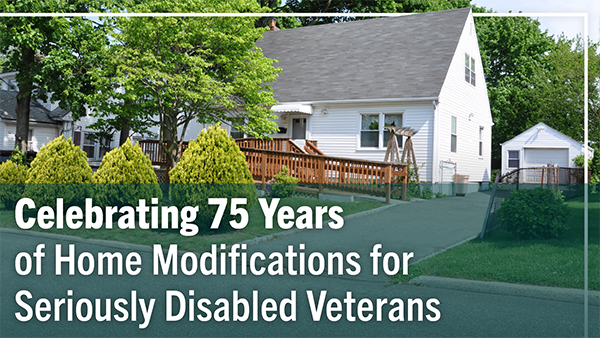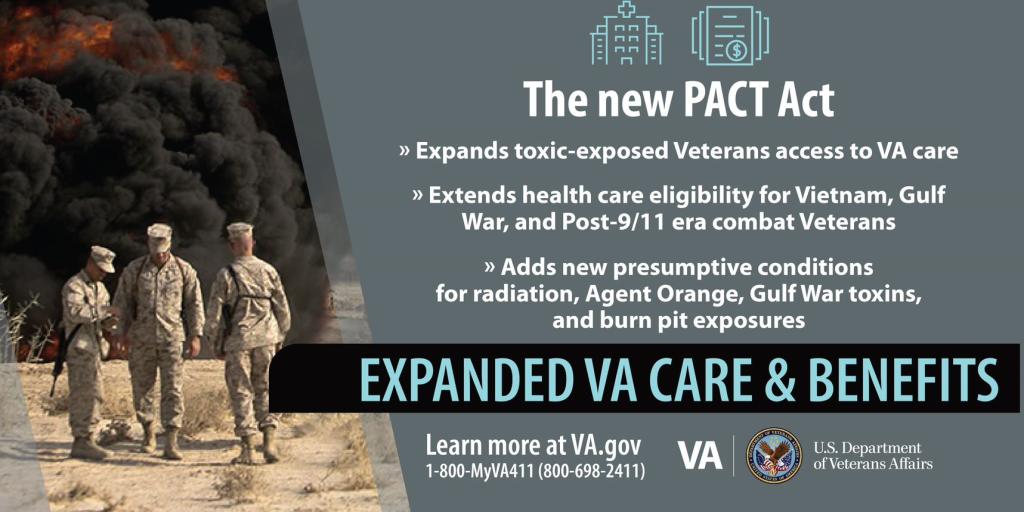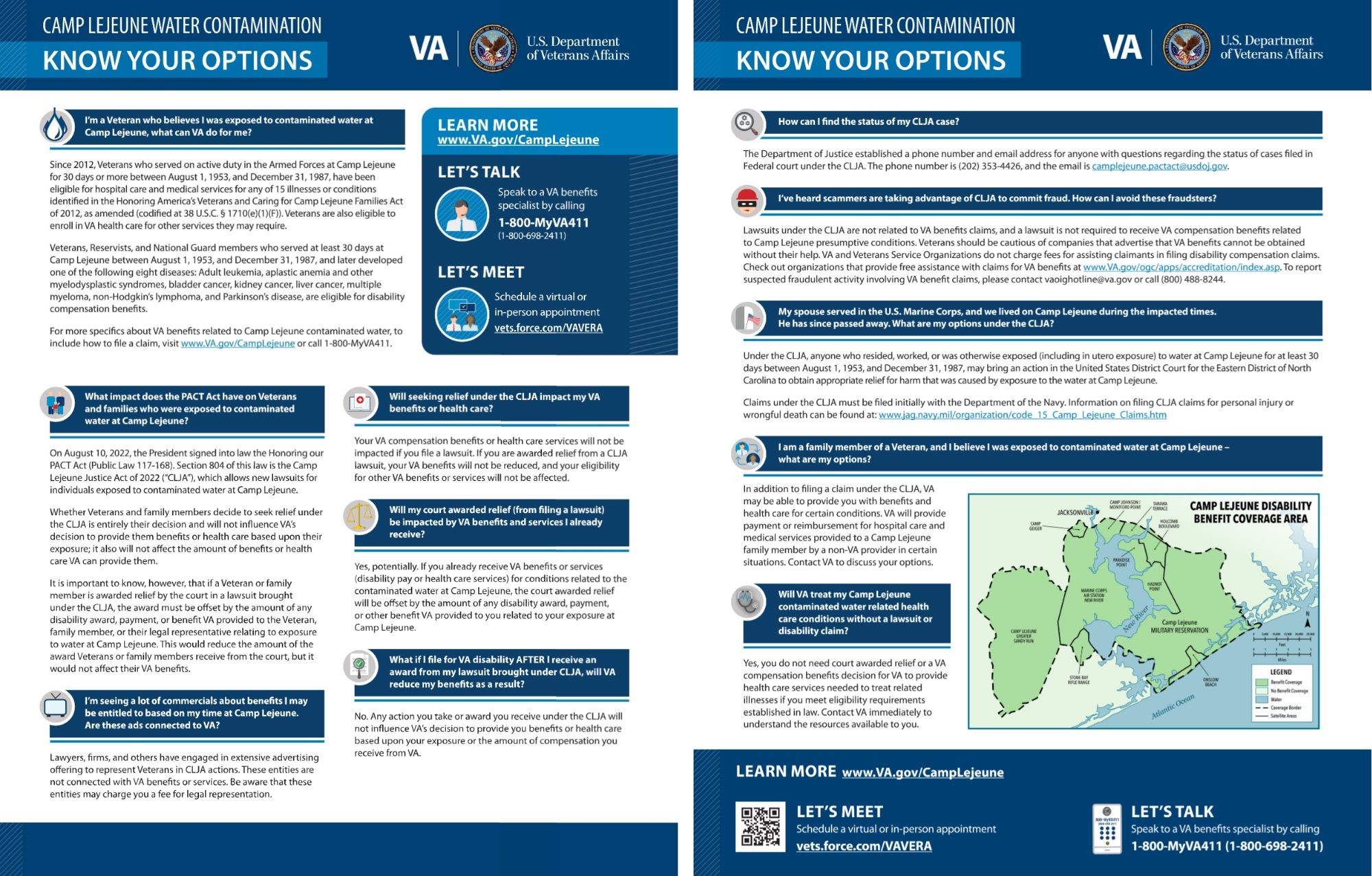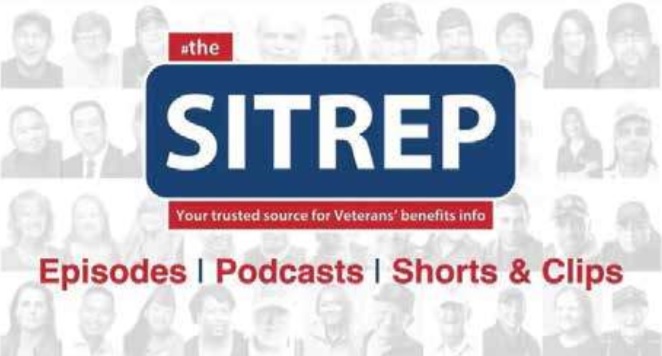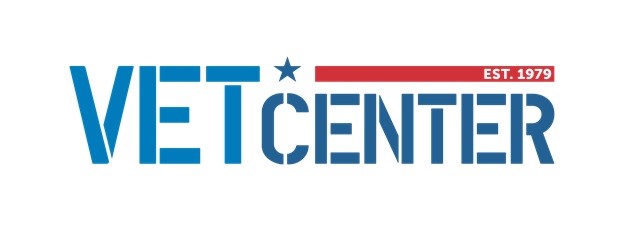
|
||||
|
If you know a veteran, please forward this issue to them (you can sign up for my mission reports here). There are some important updates, resources and information they can use. In this Update:
Celebrating 75 Years of Helping Make Home Modifications for Seriously Disabled Veterans
The U.S. Department of Veteran Affairs (VA) recently celebrated the 75th anniversary of the Specially Adapted Housing (SAH) program, which, since its creation in 1948, has provided home adaptation grants to service members and veterans with qualifying, serious service-connected disabilities through multiple eras of military service. SAH grants provide important financial support for home modifications that address the unique needs of veterans and service members. When the program first started, adaptation assistance was a one-time grant limited to $10,000, which covered up to 50% of the housing unit, land and remodeling costs to the veteran. Over time, the grant amount has grown, with annual increases calculated using the Turner building cost index. Additionally, instead of being a one-time use program, eligible veterans can use the program up to 6 different times during their lifetime. Depending on the adaptations needed, you can use as much or as little of your grant as you need. If you don’t use the full amount, you can use more money from the grant in future years. The VA adjusts the total maximum amount each year based on the cost of construction. Grant recipients may receive up to the current total maximum amount for the last year they used the grant. You can find information about both the SAH and Special Home Adaptation (SHA) grant programs here. Post-9/11 Combat Veterans: Don’t Miss This Special Health Care Enrollment PeriodYou may already know the PACT Act expands health care eligibility for many veterans. One group that may be eligible for expanded benefits are post-9/11 veterans. A one-year special health care enrollment period for post-9/11 combat veterans began on Oct. 1, 2022. Post-9/11 veterans discharged or released on or after Oct. 1, 2013, are not subject to the special enrollment period but can enroll within 10 years of their separation or discharge date. You can review more eligibility requirements on VA.gov. The VA is encouraging veterans to apply no matter their separation date. Your eligibility depends on your service history and other factors. Camp Lejeune Water Contamination Health IssuesFrom the 1950s through the 1980s, people living or working at the U.S. Marine Corps Base Camp Lejeune, North Carolina, or Marine Corps Air Station (MCAS) New River, North Carolina, were potentially exposed to drinking water contaminated with industrial solvents, benzene and other chemicals. Exposure to contaminated water at Camp Lejeune has been linked to numerous medical issues and illnesses, including various types of cancer, birth defects in children, Parkinson’s disease and more. Section 804 of the PACT Act addresses people who lived at Camp Lejeune. This law is also called the Camp Lejeune Justice Act of 2022. Anyone who lived or worked on the base for at least 30 days between Aug. 1, 1953, and Dec. 31, 1987, at Marine Corps Base Camp Lejeune or MCAS New River, may be eligible for disability and health care benefits. More information about eligibility for disability and health care benefits can be found here. You can learn more about the PACT Act and your VA benefits here. theSITREP: Benefit Payment Methods are Changing for Some Veterans and Dependents
Most veterans and beneficiaries receive VA benefit payments through electronic funds transfer (EFT), also known as direct deposit. But if you’re still receiving a paper check, changes are coming. A recent episode of “theSITREP” discusses how VA payments to veterans and dependents may be changing for those receiving paper checks. You can watch and learn, here in the YouTube episode, how to sign up for EFT payments or how to request a waiver to keep receiving a paper check. “theSITREP” is a status report that covers a wide range of topics important to veterans and their families including VA disability, VA pensions, VA health care, VA home loans, benefits for dependents, and benefits offered by other agencies and departments, such as military retirement, social security benefits and more. The program can be found on the U.S. Department of Veterans Affairs YouTube channel or by searching YouTube for #theSITREP. Veterans Can Now File Supplemental Claims Online
Veterans can now file supplemental claims online at VA.gov. Filing a supplemental claim is an option for veterans who disagree with a previously denied claim decision regarding VA disability compensation or pension benefits. The VA says this new online filing tool should speed claims decisions to veterans by saving time with supplemental claims submitted directly on VA.gov, with step-by-step, interview-style questions; allowing secure and quick uploads for additional evidence and records; and allowing veterans to save their progress on a claim so they can leave and pick up where they left off. Additionally, veterans can use their smartphones or other mobile devices to apply online, or if they would prefer, submit supplemental claims by mail if that option better meets their needs. To file a supplemental claim online, visit the File a Supplemental Claim webpage on VA.gov and complete the form. My Recommended Read for Veterans in the Month of August: General Patton’s Principles for Life and Leadership
In print since 1979 and now in its fifth edition, if you’re looking for a concise, well-organized and inspirational roadmap into the timeless philosophy and brilliant strategic thinking of an indispensable commander of men, look no further than General Patton’s Principles for Life and Leadership by Porter B. Williamson. From the book: “This is the original, first-person account of the principles by which General Patton lived his life and led his men. The book was warmly endorsed by both General Patton’s son and daughter as being true to the character of their Father — his drive, his indomitable will, his faith, his genius as a warrior, and especially of the extraordinary bond with his troops.” His many life principles are expertly grouped within the topics of Leadership, Command & Management, Fitness, Pride-Courage-Confidence, Decisions, Success, and Life & Death. I’ll close out this month’s “Recommended Read” with a few of my favorites from General Patton’s faith-driven, intellectual arsenal:
Lastly and certainly not least: Success is not getting to the top; it’s how you bounce on the bottom. What are Vet Centers?
I’ve been asked this question by several of my fellow vets and feel it’s important to provide an answer to those who haven’t reached out yet. VA Vet Centers provide free and confidential readjustment counseling for War-Zone Veterans and their families, World War II to the current Global War on Terror. Vet Centers are small, non-medical, counseling centers conveniently located in our region. They’re staffed by highly trained counselors and team members dedicated to seeing you through the challenges that come with managing life during and after the military. Our region is served by the DuBois Vet Center, which is one of 12 Vet Centers in Pennsylvania and over 300 across the country. Whether you come in for one-on-one counseling or to participate in a group session, at Vet Centers you can form social connections, try new things, and build a support system with people who understand you and want to help you succeed. The Dubois Vet Center’ website is designed to provide veterans, family members, and community partners the ability to see what services the center offers, as well as the center’s Community Access Points with a picture of the entrance so first time visitors have a frame of reference to help guide them in. From my time in the State House through my current position, I’ve had a strong relationship with the Dubois Vet Center. They have helped me help many of my fellow vets. Two Recreational Therapy Groups Available at the Dubois Vet Center As part of a national competition, the DuBois Vet Center was approved for initial funding for two recreational therapy groups. One of the groups is an introduction to fly tying for fly fishing, with one of the center’s counselors being an avid fly tyer and fisherman. The other group is a no sew blanket group, which the center hopes will generate interest from women veterans, but the group is open to anyone who would like to join. The groups will be held at the Vet Center with approximately 4 cohorts to run quarterly with 6 vets in each cohort. The center says it hopes to grow these groups and potentially be able to have them at the center’s Community Access Points (CAPs) in McKean, Centre and Blair counties, with the possibility of adding more recreational therapy groups in the future. The center noted the initial funding will help them launch the groups, but they will be actively trying to obtain additional funding they can expand on them. Who is eligible to receive services at Vet Centers? Vet Center services are available to Veterans at no cost, regardless of discharge character, and without the need to be enrolled in VA health care or having a service-connected disability. If you are a Veteran or service member, including members of the National Guard and Reserve, you can access Vet Center services if you:
Contacting your local Vet Center Even if you are unsure if you meet the criteria to receive services from a Vet Center, please contact a center. From personal experience I can tell you that, if the center can’t help you, they’ll find someone who will. Center services are also available to family members when their participation would support the growth and goals of the Veteran or active-duty service member. If you consider them family, so does your local center. Bereavement services are also available to family members of Veterans who were receiving Vet Center services at the time of the Veteran’s death, and to the families of service members who died while serving on active duty. The DuBois Vet Center, located at 100 Meadow Lane, Suite 8, DuBois, PA 15801, can be contacted at 814-372-2095 or toll free 24/7 at 1-877-WAR-VETS (927-8387). The DuBois Vet Center recently announced counseling and referral services are now being provided at the State College American Legion Post 245, in addition to the many services they offer at their locations in DuBois, Altoona, Bradford, Penn State-DuBois, Smethport and their mobile Vet Center. The other Vet Center locations in Pennsylvania are:
For more information, please visit www.vetcenter.va.gov |
||||
|
||||






Want to change how you receive these emails? 2025 © Senate of Pennsylvania | https://senatordush.com | Privacy Policy |
